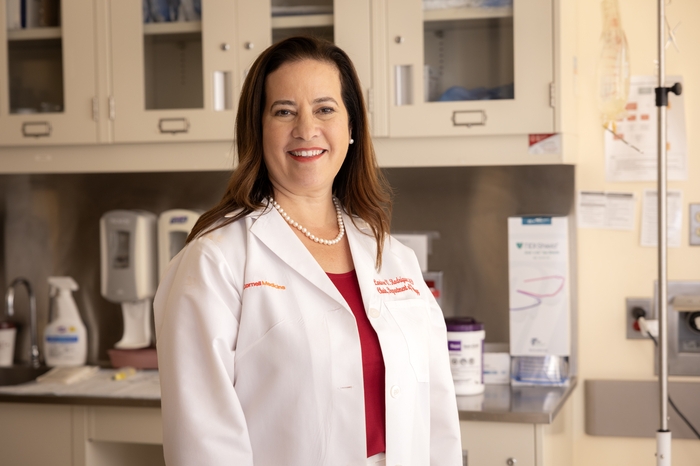Dr. Larissa V. Rodriguez, chair of the Department of Urology and the James J. Colt Professor of Urology at Weill Cornell Medicine and urologist-in-chief at NewYork-Presbyterian/Weill Cornell Medical Center, was named winner of the 2024 Victor A. Politano Award by the American Urological Association.
The award is presented annually to an individual for outstanding achievements in the field of urinary incontinence. Dr. Rodriguez is being honored for her work to advance the treatment of urinary incontinence through pioneering research and compassionate patient care. She will be recognized at the association's annual meeting in San Antonio, Texas in May.
Dr. Rodriguez, who is also director of the Center for Female Pelvic Health at Weill Cornell Medicine, has been a National Institutes of Health-funded investigator for the past 20 years, working with preclinical models evaluating the mechanisms leading to lower urinary tract symptoms. She is the principal investigator of an NIH-sponsored grant exploring the underlying causes of bladder pain syndrome and how best to treat it.
Back when she graduated in 2000, it was rare to have surgeon scientists evaluating these conditions, Dr. Rodriguez said. “There were surgeons developing different techniques to treat women but there was very little understanding of the pathophysiology, the basic science of why a woman developed these conditions,” she said. Early in her career, she chose to do postdoctoral research training under Dr. Louis Ignarro, a Nobel Laureate, examining vaginal and support tissues in the lab “to understand what was happening at a tissue level that women were developing these disorders.”
Getting her start as a mathematics major at Massachusetts Institute of Technology gave Dr. Rodriguez a background as a scientist, which led her to her career path as a surgeon-scientist, she said. But her real love of urology stems from the fact that she’s changing people’s lives – women’s, especially.
Dr. Rodriguez was also drawn to this field because she wanted to reach those who may never seek treatment for a problem like incontinence, which can be viewed as embarrassing, she said, “These conditions, which affect so many people, get a lot less attention: media attention, educational attention and research funding. People suffer in silence because there is often shame associated with it.”
She’s working to change that stigma with her research, which includes animal models of pelvic floor disorders such as urinary incontinence, urinary frequency, and bladder and pelvic pain, as well as clinical investigations of those who suffer from these conditions.
“I have published and worked with cell-based therapies for urethral regeneration, especially after aging and vaginal deliveries, to try to see if we can restore the function of the urethra,” she said. “We hope to translate those therapies to humans.”
Dr. Rodriguez has done work in the development of new surgical techniques to treat urinary incontinence and quality-of-life assessments and outcomes, and evaluations of different surgeries and procedures. She’s also working to understand why women develop urinary frequency and bladder pain, including clinical trials in patients with overactive bladder.
“I chose to specialize in urology and urogynecology because I’m interested in the long-term relationship one creates with patients—a field that combines areas of medical care with surgical interventions to improve the patient’s quality of life,” she said.

